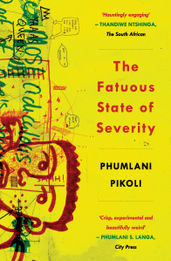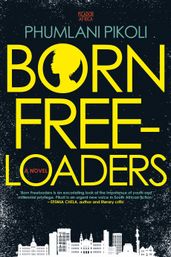Phumlani Pikoli's COVID-19 musings: We aren’t approaching a new normal...
"We’re seeing beautiful returns all over the globe, the planet is reasserting its natural majesty. From the Venice canals to unpolluted airs space revealing The Universal Ring orbiting our splendid earth." - Phumlani Pikoli, a multidisciplinary artist whose writing has been described as ‘a generational ode’, shares his musings on the novel coronavirus.

We aren’t approaching a new normal.
Chances are much like anything else charged with cosmic or karmic balance, this current reset is an opportunity for some and evil for others. The last little while has been such a trip that has forced most of us to consider and reconsider the archaic value of a system predicated on exploitation and prehistoric modes of governance. At home, we’re watching people who’ve been championing slogans like “Fourth Industrial Revolution” suddenly mask themselves in amnesia now that they’ve been dragged into a digital world that has been humming along quietly without them.
We’re seeing people who lived under oppression and tyranny of the majority in silence and feigned ignorance, suddenly claim to be living under the very crime against humanity they didn’t understand before, with no sense of irony. Am I using this word correctly?
We aren’t approaching a new normal.
The world has made clear its contempt of man’s worst animal, and I don’t think it’s unfair for a planet being destroyed, to at the very least, put its hands up in order to protect its face when under constant physical attack. We’re seeing beautiful returns all over the globe, the planet is reasserting its natural majesty. From the Venice canals to unpolluted airs space revealing The Universal Ring orbiting our splendid earth. We are living out The Truman Show no?
Trumps (Jokes) aside, there are little paranoias that are valid and should be considered. Like the idea of a little taste of lockdown power turning into a hoarder’s greed, after all the ANC are fast approaching that dreaded and fateful relinquishing end of power that most revolutionary movements have to face.
We aren’t approaching a new normal.
More than anything, in this time people have shown themselves to be who they truly are at their very core, toilet paper hogging, self-interested beachside running, and self-serving scientific experts.
In the end, people are wired for survival and none of this is very surprising. It’s just always interesting to note how often just how little empathy and compassion we have in the world. It’s not sad, more than it is expected which is the saddest. One would hope that in the age of social media, where even the smallest act of kindness could travel to billions in a matter of hours, that performative nature would actually rub off in a meaningful way.
While the tedium of lockdown has taken a massive toll on our mental states and worse for the poor, the homeless, or those trapped inside with villains and tormentors. I can’t help but selfishly not look forward to its end.
“They say when you meet the love of your life, time stops, and that's true. What they don't tell you is that when it starts again, it moves extra fast to catch up.” Daniel Wallace, Big Fish.
I can’t even begin to imagine the catching up greedy corporations and industries will do in order to catch up.
There is no new normal.
The Fatuous State of Severity
by Phumlani Pikoli
The Fatuous State of Severity is a fresh collection of short stories and illustrations that explores themes surrounding the experiences of a generation of young, urban South Africans coping with the tensions of social media, language insecurities and relationships of various kinds.
Intense and provocative, this new edition of the book, which was first self-published in 2016, features six additional stories as well as an introductory essay on Phumlani Pikoli’s publishing journey.
Born Freeloaders
by Phumlani Pikoli
Born on the cusp of democracy, the crew of young friends in Born Freeloaders navigates a life of drinking, wild parties and other recklessness. The siblings at the centre of the novel, Nthabiseng and Xolani, have been raised in an upper middle-class family with connections to the political elite. Nthabiseng is lauded by her peers as she whimsically goes through life, unable to form her own identity in a world that expects her to pick a side in the fractured classifications of race. Xolani, not having known his late father, longs for acceptance from an uncle who sees him and his generation as the bitter fruit borne of a freedom he and countless others fought for.
As the story moves across multiple spaces in the nation’s capital over a weekend, Born Freeloaders captures a political and cultural moment in the city’s and South Africa’s history. Interwoven is an analogous tale of the country’s colonisation and the consequences that follow. And alongside the friends’ uneasy awareness of their privilege is a heightened sense of discomfort at their inability to change the world they were born into.

